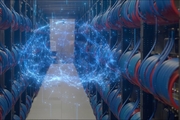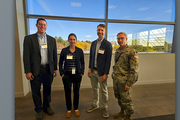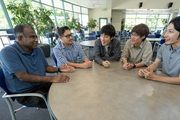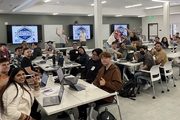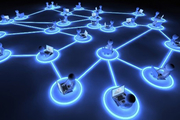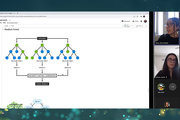Did you know we have a monthly newsletter? View past volumes and subscribe.
Igniting scientific discovery with AI and supercomputing (VIDEO)
April 15, 2024 -
LLNL’s fusion ignition breakthrough, more than 60 years in the making, was enabled by a combination of traditional fusion target design methods, high-performance computing (HPC), and AI techniques. The success of ignition marks a significant milestone in fusion energy research, and was facilitated in part by the precision simulations and rapid experimental data analysis only possible through...
Welcome new DSI team members
April 2, 2024 -
When Data Science Institute (DSI) director Brian Giera and deputy director Cindy Gonzales began planning activities for fiscal year 2024 and beyond, they immediately realized that LLNL’s growth in data science and artificial intelligence (AI)/machine learning (ML) research requires corresponding growth in the DSI’s efforts. “Our field is booming,” Giera states. “The Lab has a stake in the...
Predicting climate change impacts on infrastructure (VIDEO)
Feb. 26, 2024 -
At LLNL, electrical grid experts and climate scientists work together to bridge the gap between infrastructure and climate modeling. By taking weather variables such as wildfire, flooding, wind, and sunlight that directly impact the electrical grid into consideration, researchers can improve electrical grid model projections for a more stable future. In a new video, LLNL computer scientist...
Machine learning tool fills in the blanks for satellite light curves
Feb. 13, 2024 -
When viewed from Earth, objects in space are seen at a specific brightness, called apparent magnitude. Over time, ground-based telescopes can track a specific object’s change in brightness. This time-dependent magnitude variation is known as an object’s light curve, and can allow astronomers to infer the object’s size, shape, material, location, and more. Monitoring the light curve of...
Lab partners with new Space Force Lab
Nov. 14, 2023 -
LLNL subject matter experts have been selected by the U.S. Space Force to help stand up its newest Tools, Applications, and Processing (TAP) laboratory dedicated to advancing military space domain awareness (SDA). The Livermore team attended the October 26 kickoff in Colorado Springs of the SDA TAP lab’s Project Apollo technology accelerator, designed with an open framework to support and...
Data Science Summer Institute hosts student interns from Japan
Oct. 13, 2023 -
The Data Science Summer Institute (DSSI) hosted summer student interns from Japan on-site for the first time, where the students worked with Lab mentors on real-world projects in AI-assisted bio-surveillance and automated 3D printing. From June to September, the three students—Raiki Yoshimura, Shinnosuke Sawano and Taisei Saida—lived in rental apartments near the Lab and worked at the Lab on...
UC Merced & UC Riverside tackle Data Science Challenge on ML-assisted heart modeling
Aug. 3, 2023 -
For the first time, students from the University of California (UC) Merced and UC Riverside joined forces for the two-week Data Science Challenge (DSC) at LLNL, tackling a real-world problem in machine learning (ML)-assisted heart modeling. Held in the Livermore Valley Open Campus’s newly remodeled University of California Livermore Collaboration Center from July 10-21, the event brought...
High-performance computing, AI and cognitive simulation helped LLNL conquer fusion ignition
June 21, 2023 -
For hundreds of LLNL scientists on the design, experimental, and modeling and simulation teams behind inertial confinement fusion (ICF) experiments at the National Ignition Facility, the results of the now-famous Dec. 5, 2022, ignition shot didn’t come as a complete surprise. The “crystal ball” that gave them increased pre-shot confidence in a breakthrough involved a combination of detailed...
Data science meets fusion (VIDEO)
May 30, 2023 -
LLNL’s historic fusion ignition achievement on December 5, 2022, was the first experiment to ever achieve net energy gain from nuclear fusion. However, the experiment’s result was not actually that surprising. A team leveraging data science techniques developed and used a landmark system for teaching artificial intelligence (AI) to incorporate and better account for different variables and...
Celebrating the DSI’s first five years
May 18, 2023 -
View the LLNL Flickr album Data Science Institute Turns Five.
Data science—a field combining technical disciplines such as computer science, statistics, mathematics, software development, domain science, and more—has become a crucial part of how LLNL carries out its mission. Since the DSI’s founding in 2018, the Lab has seen tremendous growth in its data science community and has invested...
Patent applies machine learning to industrial control systems
May 8, 2023 -
An industrial control system (ICS) is an automated network of devices that make up a complex industrial process. For example, a large-scale electrical grid may contain thousands of instruments, sensors, and controls that transfer and distribute power, along with computing systems that capture data transmitted across these devices. Monitoring the ICS network for new device connections, device...
Computing codes, simulations helped make ignition possible
April 6, 2023 -
Harkening back to the genesis of LLNL’s inertial confinement fusion (ICF) program, codes have played an essential role in simulating the complex physical processes that take place in an ICF target and the facets of each experiment that must be nearly perfect. Many of these processes are too complicated, expensive, or even impossible to predict through experiments alone. With only a few...
Skywing: Open-source software aids collaborative autonomy applications
Jan. 25, 2023 -
A new software developed at LLNL, and known as Skywing, provides domain scientists working to protect the nation’s critical infrastructure with a high-reliability, real-time software platform for collaborative autonomy applications. The U.S. modern critical infrastructure—from the electrical grid that sends power to homes to the pipelines that deliver water and natural gas and the railways...
New HPC4EI project to create 'digital twin' models for aerospace manufacturing
Jan. 19, 2023 -
A partnership involving LLNL aimed at developing “digital twins” for producing aerospace components is one of six new projects funded under the HPC for Energy Innovation (HPC4EI) initiative, the Department of Energy’s Office of Energy Efficiency and Renewable Energy announced. Sponsored by the HPC4Manufacturing (HPC4Mfg) Program, one of the pillars of HPC4EI, the collaboration between LLNL...
National Ignition Facility achieves fusion ignition
Dec. 13, 2022 -
The U.S. Department of Energy (DOE) and DOE’s National Nuclear Security Administration (NNSA) today announced the achievement of fusion ignition at LLNL—a major scientific breakthrough decades in the making that will pave the way for advancements in national defense and the future of clean power. On Dec. 5, a team at LLNL’s National Ignition Facility (NIF) conducted the first controlled...
Understanding the universe with applied statistics (VIDEO)
Nov. 17, 2022 -
In a new video posted to the Lab’s YouTube channel, statistician Amanda Muyskens describes MuyGPs, her team’s innovative and computationally efficient Gaussian Process hyperparameter estimation method for large data. The method has been applied to space-based image classification and released for open-source use in the Python package MuyGPyS. MuyGPs will help astronomers and astrophysicists...
ESGF launches effort to upgrade climate projection data system
Oct. 5, 2022 -
The Earth System Grid Federation (ESGF), a multi-agency initiative that gathers and distributes data for top-tier projections of the Earth’s climate, is preparing a series of upgrades that will make using the data easier and faster while improving how the information is curated. The federation, led by the Department of Energy’s Oak Ridge National Laboratory in collaboration with Argonne and...
An open-source, data-science toolkit for energy: GridDS
Aug. 2, 2022 -
As the number of smart meters and the demand for energy is expected to increase by 50% by 2050, so will the amount of data those smart meters produce. While energy standards have enabled large-scale data collection and storage, maximizing this data to mitigate costs and consumer demand has been an ongoing focus of energy research. An LLNL team has developed GridDS—an open-source, data-science...
Defending U.S. critical infrastructure from nation-state cyberattacks
July 21, 2022 -
For many years, LLNL has been conducting research on cybersecurity, as well as defending its systems and networks from cyberattacks. The Lab has developed an array of capabilities to detect and defend against cyberintruders targeting IT networks and worked with government agencies and private-sector partners to share its cybersecurity knowledge to the wider cyberdefense community. LLNL has...
Winter hackathon meets WiDS datathon
March 9, 2022 -
Sponsored by the DSI, LLNL’s winter hackathon took place on February 16–17. Hackathons are 24-hour events that encourage collaborative programming and creative problem solving. In addition to traditional hacking, the hackathon included a special datathon competition in anticipation of the Women in Data Science (WiDS) conference on March 7. Hackathon and datathon participants presented their...

